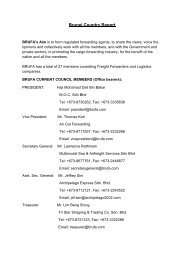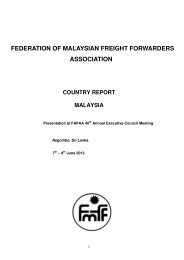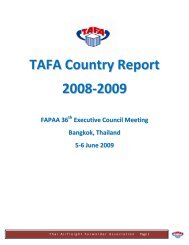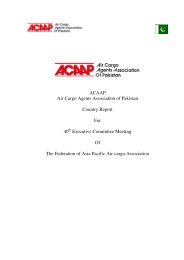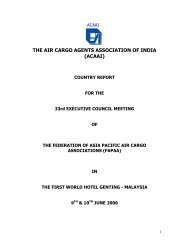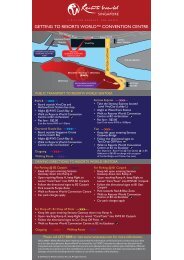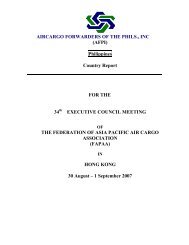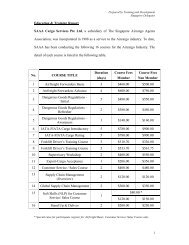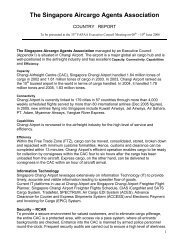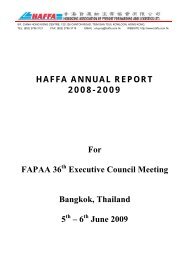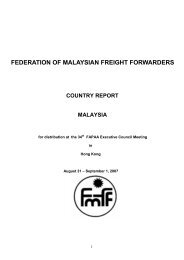Summary of report - FAPAA
Summary of report - FAPAA
Summary of report - FAPAA
- No tags were found...
You also want an ePaper? Increase the reach of your titles
YUMPU automatically turns print PDFs into web optimized ePapers that Google loves.
2particular interest to Australia, where IATA exemptions to aspects <strong>of</strong> the local tradepractices act were currently under review. However, the European Cargo Agencyprogramme (ECAP) - the joint venture between IATA and European freight forwarders -was still planned to go ahead and it was now even more important than this modernagreement should succeed in order to prevent unpleasant circumstances arising frompotential breaches <strong>of</strong> anti-trust laws. <strong>FAPAA</strong> hoped that this could pave the way for theagreement to be extended to other regions <strong>of</strong> the World ! FWC Congress delegates hadbeen advised that IATA resolution 502 had not been ratified, where required, by variousGovernments around the world and was therefore stalled indefinitely. <strong>FAPAA</strong> membersagreed to continue un<strong>of</strong>ficial dialogue with FIATA on relevant air cargo issues affecting allparties.IT & E COMMERCE INNOVATION - chaired by AustraliaDemetrios Zoppos and Soren Starrup-Nielsen <strong>of</strong> Global Freight Exchange (GF-X) gave apresentation on their rapidly growing interactive booking and tracking programme. Thisfacility had taken hold in many countries, particularly in Europe and its acceptance andpopularity continued to grow throughout the world. GF-X made a commitment to developan incentive programme to interest <strong>FAPAA</strong> member countries.RESEARCH AND DEVELOPMENT - chaired by SingaporeSecurity was high on the agenda a presentation was given by David Fielder (HAFFA,Hong Kong) on ’TAPA’ (Technology Asset protection Association), who, in one <strong>of</strong> it’sroles, sets benchmarks and standards by which depots, warehouses and other cargoterminals may seek accreditation for storing international air cargo in a secureenvironment. The USA-‘C-TPAT’ process recognises this accreditation. Delegates alsodiscussed the status <strong>of</strong> each country in terms <strong>of</strong> international air cargo securityprogrammes such as the ‘Regulated Agent’ regime and the risk minimisation processesfavoured by each economy.. Security being high on the agenda for all organisations inevery country, it was agreed that <strong>FAPAA</strong> should have this as a separate agenda item infuture.IATA / CASS Forum<strong>FAPAA</strong> continued its close working relationship with IATA and Nick Zakris, Director Carg<strong>of</strong>or Asia Pacific addressed the meeting on the status <strong>of</strong> CASS (where it operated within<strong>FAPAA</strong> member countries) and the future expansion <strong>of</strong> the facility within the region. Inaddition, Nick Zakris presented details <strong>of</strong> the new ‘Cargo MF’ product - a statisticalinformation package available in CASS countries and introduced discussion as to how<strong>FAPAA</strong> as an organisation could help to market and promote the information to itsmembers. Relevant <strong>FAPAA</strong> member countries were interested and agreed to furtherdiscussions with IATA on the details.In closing the session, IATA reminded the members <strong>of</strong> new mandatory requirementscoming into place on January 1 st , 2004 relating to IATA Resolution ‘600’ rule changesrequiring dimensions <strong>of</strong> cargo to be placed in the ‘nature and quantities goods’ box on theairway bill.
3CARGO 2000 update presentation<strong>FAPAA</strong> welcomed back Ron Cesana <strong>of</strong> ‘Cargo 2000’ group (who last presented to the<strong>FAPAA</strong> members in 2001). Since that time, the organisation has further streamlined itsstandards and benchmarking systems used by airlines and freight forwarders to reducethe number <strong>of</strong> steps in the air cargo process. The programme had seen a greaterinvolvement from freight forwarders recently and the major multi-nationals were all nowinvolved in some way or another. Cesana announced that phase III <strong>of</strong> Cargo 2000 wouldinclude security processes. <strong>FAPAA</strong> pledged to continue the promotion and awareness <strong>of</strong>Cargo 2000 to its’ combined membership.TRAINING AND EDUCATION ForumEach <strong>FAPAA</strong> member country delivered a detailed <strong>report</strong> on the progress and status <strong>of</strong>this vital area within their own Association. Once again most countries had eitherdeveloped and were delivering, or facilitating some form <strong>of</strong> training and education for andon behalf <strong>of</strong> their own membership.The benefit <strong>of</strong> the <strong>FAPAA</strong> network was also evident in that Australia (AFIF) had providedassistance to Sri Lanka (SLFFA) for the development and delivery <strong>of</strong> a basic andadvanced programme <strong>of</strong> airfreight training, which would be followed up with sea freighttraining in January 2004. This programme had built on the previous joint venture betweenthe two organisations in 1997/98.Forwarders LIABILITY INSURANCEThere was much discussion regarding the dramatic increase in premiums for freightforwarders liability insurance (including errors and omissions, fines and duties etc.). Manyfactors had contributed to the increase, not least <strong>of</strong> which was the fall out from September11 th 2001. The group discussed whether the potential volume purchasing power would be<strong>of</strong> interest to an insurance underwriter to look at reduced premiums for freight forwardingmembers <strong>of</strong> <strong>FAPAA</strong> Associations. Initial investigations would be carried out in conjunctionwith key insurance consultants.ANNUAL GENERAL MEETINGAt the AGM, Sam Katgara <strong>of</strong> ACAAI, India was elected <strong>FAPAA</strong> chairman for the next twoyear term, whilst Diren Hallock was given due credit for leading the organisation throughdifficult times in his four years as chairman. The members elected delegates to otherexecutive positions on the <strong>FAPAA</strong> ‘main Board’ as follows: Deputy Chair: - Australia; Hon-Secretary:- Malaysia; Hon-Treasurer:- Hong Kong.NEXT MEETING:-It was agreed that the 31 st <strong>FAPAA</strong> Executive Council Meeting and AGM would be held inAustralia in May or June 2004, with the date and venue to be announced.All delegates congratulated host Association NEFFA on facilitating a first-class event,where the local organising committee had worked extremely hard to ensure all necessaryarrangements were in place and coordinated effectively. The local press had also showna high degree <strong>of</strong> interest in the proceedings, providing good coverage in both print and TVmediums.
Brian Lovell4



